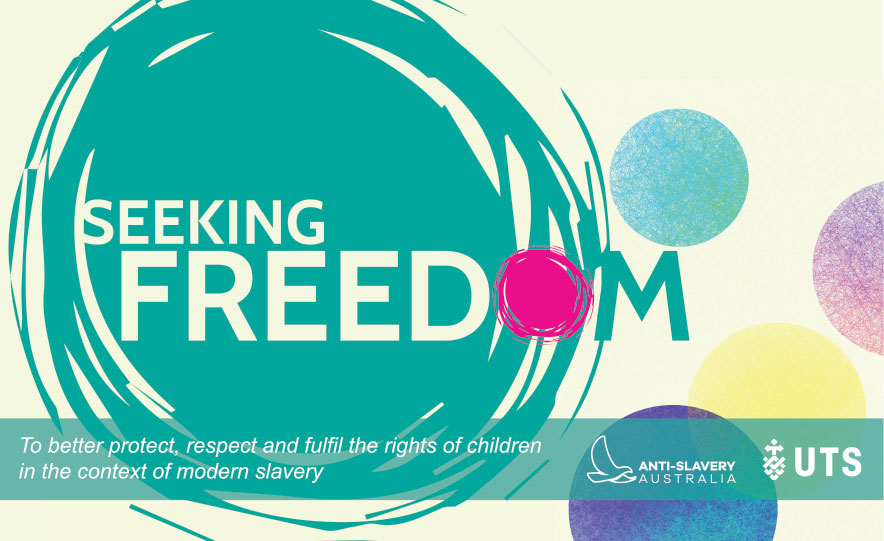Seeking Freedom is Anti-Slavery Australia’s child-rights initiative. The purpose of this project is to better protect, respect and fulfil the rights of children in the context of modern slavery. Through policy development, collaboration, education and awareness-raising, we seek to increase the identification of children subject to human trafficking, slavery and slavery-like practices as well as develop a better understanding of, and ability to meet, the needs of child victim-survivors of modern slavery in Australia.
Our Motivation
Modern slavery involving children can take various forms including trafficking, servitude, slavery, sexual exploitation, forced marriage, the worst forms of child labour and the sale of children. Children in situations of modern slavery are particularly vulnerable to abuse and exploitation. They are less likely to be identified as victim-survivors, and their wellbeing and psycho-social development can be harmed, sometimes irreparably.
Global estimates by the ILO and Walk Free Foundation suggest that one in four victim-survivors of modern slavery are children, while UNODC statistics indicate that children account for one third of all detected victim-survivors of human trafficking worldwide. In contrast to these global figures, reported cases of child trafficking, slavery and slavery-like practices in Australia remain low and there is a clear research gap on the prevalence and experience of children in or at risk of modern slavery.
Given the low identification figures and the lack of data on the nature and scope of the issue, we are concerned that children in Australia are not being identified as victim-survivors of modern slavery and as such are being deprived of their fundamental rights to protection and support. The development and adoption of a child rights framework is central to ensuring Australia’s response to combatting modern slavery is comprehensive, evidence-based and survivor informed and aligns with its international human rights obligations under the Convention on the Rights of the Child and its Optional Protocols.
Our Expected Outcomes
Through collaboration with relevant stakeholders including those with lived experience, government departments, child protection organisations, service providers, national and state/territory human rights institutions and civil society organisations, we will deliver on the following outcomes:
- Child rights framework – designed for use by decision-makers, to guide the implementation of effective policies that protect, respect and fulfil the rights of children in the context of modern slavery.
- Frontline worker resources – such as a frontline worker guide, providing practical guidance on child-specific standards of good practice in the context of modern slavery.
- Webinar series – exploring in greater detail the key findings of the research project, in particular the child rights framework.
- Advocacy campaign – focusing on the implementation of critical aspects of the developed framework that require immediate action.
- Academic publications – building the evidence base on the issue of children in or at risk of modern slavery in Australia.
Our Progress
In March 2022, the Seeking Freedom team convened an online webinar on the rights of children in the context of modern slavery that brought together individuals from diverse sectors to discuss Australia’s response to at risk children. The webinar was designed to be the first step in engaging relevant stakeholders on the need to develop a child-specific modern slavery response in Australia that safeguards the rights of children. Our esteemed panel of speakers included Professor Jennifer Burn (Director, Anti-Slavery Australia), Professor Parosha Chandran (International Human Rights Barrister), Natalie Siegel-Brown (Managing Director, Child Wise), Frances Finney PSM (Assistant Secretary, Modern Slavery and Human Trafficking Branch, Australian Border Force) and Sandeep Dhillon (Human Rights Legal Practice Manager, Anti-Slavery Australia).
Drawing on the momentum gained from the webinar, between November 2022 and March 2023, Anti-Slavery Australia facilitated a series of four roundtable discussions with experts from various sectors working in the areas of child rights, child protection and/or modern slavery. The four sessions each focused of one of the following key aspects of the child-rights framework: prevention, identification, protection and participation – and examined Australia’s current response to child trafficking, slavery and slavery-like practices as well as good practice policy measures that could be adopted.
Our interim findings from the roundtable discussions will be published on this page in due course.
The Seeking Freedom project is guided by an expert Steering Committee and has been approved in line with the University of Technology Sydney Human Research Ethics Committee (UTS HREC) guidelines (Ref: ETH22-7198).
For further information on this project, please contact Cassandra Bourke – Project Lead or Jennifer Burn – Director on (02) 9514 9660 and ASAresearch@uts.edu.au.
